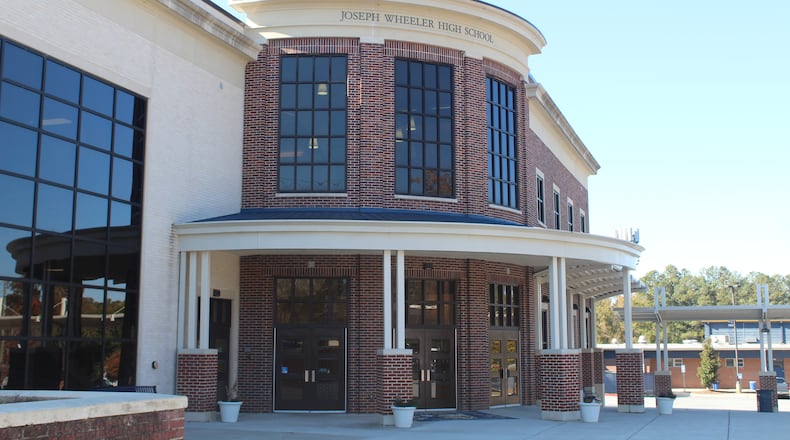Cobb County students will appeal Thursday to the school board to rename Joseph Wheeler High School. Thus far, students report little headway in their campaign to strip the name of the Confederate general from their Marietta campus.
Nationwide, communities are re-evaluating names on public buildings that honor Confederates or those who espoused white supremacist views. Many Georgia cities, parks and schools commemorate historic figures from the Confederacy.
Education Week has been tracking this issue nationally, reporting most of the Confederate-named schools are concentrated in seven states—Alabama, Georgia, Florida, Louisiana, North Carolina, Texas and Virginia. At the beginning of June, 2020, at least 229 schools in 19 states were named for men connected to the Confederacy. As of late June, at least 31 of the Confederate-named schools changed names, according to Ed Week. See the data here.
In Georgia, Atlanta Public Schools decided to rename two schools. including Grady High School, which is becoming Midtown High. Students led the effort there to erase 19th century orator and newspaper editor Henry V. Grady from their building facade because of his racist views. The class of 2021 will be the last graduates to see the Grady name on diplomas.
Cobb students hope to do the same with Wheeler and have formed the Wheeler Name Change Initiative, the goal of which is to spread awareness that the school was named after a Confederate general in the mid-1960s in a rebuke to the civil rights movement.
Speaking about Thursday’s school board session, Wheeler Name Change initiative member Jake McGhee said, “The school board has twice denied our request to make our research presentation an agenda item, which was our goal for this upcoming board meeting. Instead, we have lined up nearly a dozen speakers from Wheeler and other Cobb County schools to share their experiences and demand action.”
Here is a guest column by Wheeler sophomore Sonaj Sanders explaining in more detail why students endorse a name change.
By Sonaj Sanders
For the past year, we, the students of Wheeler High School, have been doing the work of intuitive research and gathering of community opinion on the name of our school. We have learned that Joseph E. Wheeler was not a person for whom our school should be named.
He has no ties to Cobb County. Despite Wheeler’s later service in the U.S. Army, it’s the earlier chapter of his life as a Confederate general that led to his name appearing over the front doors of the school when it opened in 1965. Our high school was named for a Confederate general amid the civil rights movement and the year Cobb County voted to integrate its schools. As the school’s first yearbook states, “This is the place which bears the name of the Confederate general, Joseph E. Wheeler.”
On behalf of the Wheeler Name Change Initiative, we are asking Cobb County school board members to listen to the students they swore to serve when elected. We want to see a new name for our school and a committee to evaluate other potential problematic names in Cobb.
Our voices have not been heard and are being ignored by several members of the board. An unwillingness to interact with us has been made clear through the multitude of emails we sent to them that have gone unanswered.
Credit: undefined
Credit: undefined
These board members are not working with us; they are fighting against us. It is imperative the Cobb County School District act on its commitment to foster a welcoming learning environment for all students. We seek a space of cultural sensitivity and empathy and ask the community to recognize its responsibility to ensure every measure is taken toward a better future.
I have become keenly aware of the importance of community involvement after attending and speaking at board meetings. The advocacy by Wheeler students has shone a light on a troubling lack of responsiveness by some of the board. It reveals how systemic racism is perpetuated through powerful institutions and entities with tight grips on power who make decisions but don’t use their power to better the community.
A public school with a diverse population has no reason to be named after a person who fought to uphold slavery. In the South, public spaces and buildings were named for Confederates and white supremacists as a snub to integration. As a black student, I am appalled to walk the halls of a school that’s name was meant to keep people like me out.
About the Author



